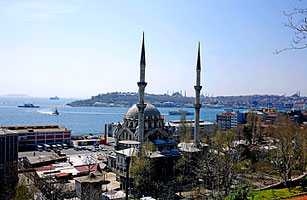ATAA ASSURES CALIFORNIA PRISON PAROLE BOARD DENIES PAROLE TO ARMENIAN TERRORIST SASSOUNIAN
On August 4, 2010, the California Prison Parole Board denied Armenian terrorist, Hampig Sassounian, parole. The Assembly of Turkish American Associations (ATAA), representing over 500,000 Turkish and Turkic Americans nationwide, participated in the hearing, submitting a Statement in Opposition to the Parole of Sassounian. Click here to read the ATAA’s statement and supporting documents.
The ATAA actively participates in judicial processes to support the conviction and sentencing of terrorists with a view toward achieving complete justice for the victims. ATAA is pleased that Sassounian was denied parole, as he and his followers continue to be a threat to the public. ATAA will appear at Sassounian’s next parole hearing in 2013 to make sure that he remains behind bars for life.
ARMENIAN TERRORIST HAD TRIED TO SNEAK TO LEBANON
Sassounian is serving a life sentence for the racist and political assassination of Turkish Consul General Kemal Arikan on January 28, 1982 in Los Angeles. The first attempt on Mr. Arikan’s life occurred on October 6, 1980, when Hampig Sassounian’s older brother, Harout Sassounian, fire-bombed the Consul General’s home. Harout Sassounian was convicted of the attempted killing.
Two years later, Hampig Sassounian and his accomplice Krikor Saliba massacred Mr. Arikan just outside of his residence as he waited in his vehicle at a traffic light. Their reason was that they hate Turks. LAPD captured Sassounian shortly after the killing. Sassounian’s father stated on national television that he was glad that a Turk was killed. LAPD searched Sassounian’s automobile, seizing a .357 caliber bullet and a one-way airline ticket from Los Angeles to Beirut. LAPD also searched Sassounian’s home, where they seized a gun receipt, pistol targets, and a manifesto of “The Armenian Youth Federation.”
TERORIST CAMPS ROUTED OUT
Federal authorities connected Sassounian and Saliba to the Justice Commandos of the Armenian Genocide (JCAG) terrorist group, which recruited members from the Armenian Youth Federation. JCAG serves as the militant wing of the Armenian Revolutionary Federation (ARF) political party in Armenia, whose foreign agent in the United States is the Armenian National Committee of America (ANCA). ANCA is represented in California by ANC Western Region in Glendale. Hampig Sassounian bears an ARF tattoo on his chest. It should be noted that Sassounian’s partner, Saliba, fled to Beirut shortly after the assassination, in response to which Turkish and Israeli intelligence joined efforts to uproot Armenian terrorist camps in Lebanon.
ATAA’S VICTIM IMPACT STATEMENT: A FIRST
The ATAA’s statement was the first appearance of a Turkish American organization at a parole hearing of an Armenian terrorist. In 2000, the ATAA also appeared at the criminal sentencing of Mourad Topalian, the former chairman of ANCA who was convicted of weapons and explosives charges which federal authorities connected to at least four terror attacks on American soil.
NAMELESS, FACELESS WARRIORS BEHIND THE SUCCESS STORY
On behalf of the ATAA Board of Directors, I thank ATAA Western Region VP Maria Cakırağa for submitting the ATAA’s statement on behalf of the citizens of California. I thank ATAA legal intern, Lale Eskicioğlu, and research assistant, Duygu Ozcan, for their tireless research and technical support.
The LAPD required the provision of bullet-proof vehicles, followed and lead by several secret service vehicles during the trip to San Luis Obispo Prison, indicating the threat level of modern Armenian political violence.
Though Sassounian’s lawyer, Michael Geragos degraded ATAA at the hearing, Parole Commissioner Peppler expressed that the ATAA’s Statement provided a much necessary history of Armenian terrorism and political violence.
I take special note here that based on ATAA’s information and belief, the Armenian Republic submitted to the Parole Board a statement in support of Hampig Sassounian, including providing him Armenian citizenship and a residence in Armenia. By doing so, the Armenian Republic supported terrorism and undermined rapprochement.
DINK MARTYRIZED, ARIKAN FORGOTTEN
On behalf of Turkish Americans nationwide, ATAA expresses its deepest condolences and respects to Mrs. Arikan and her family for their loss and for their sacrifices. We have not forgotten you. You will always be in our hearts.
Respectfully submitted,
Gunay Evinch
President
Assembly of Turkish American Associations
———————–
PS: For exhibits provided to the parole board, please log on to www.ataa.org.
PPS: The paragraphs heading above added for emphasis by the columnist; they do not appear on the original letter.


 Graphic
Graphic  Graphic
Graphic 

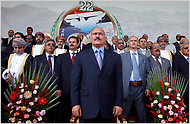


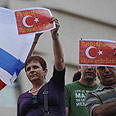
 The growing rift between Israel and Turkey following the tragic results of the Gaza aid
The growing rift between Israel and Turkey following the tragic results of the Gaza aid 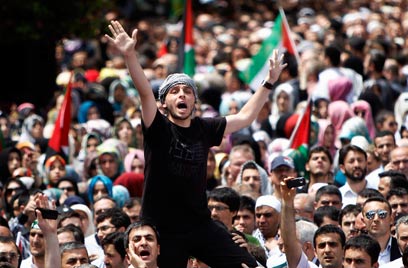 Mutual interests will prevail? Anti-Israel rally in Turkey (Reuters)
Mutual interests will prevail? Anti-Israel rally in Turkey (Reuters)
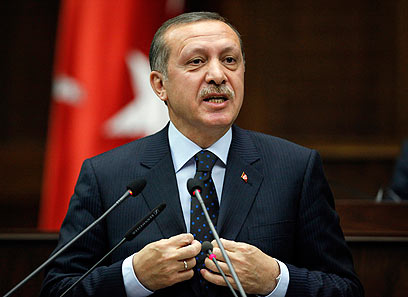 Entangled with the West. Turkish PM Erdogan (Photo: Reuters)
Turkey, he added, is facing a complex situation not only where Israel is concerned, but with the United States and Europe as well. "(Turkish Prime Minister Recep Tayyip) Erdogan's policies are hurting Turkey's ties with the West, but even within his powerbase – and a big part of that is Turkey's new business elite – many have business ties with Israel and their interests are to preserve ties.
"Here too, there are those who are furious with Turkey, but want to preserve business ties."
Entangled with the West. Turkish PM Erdogan (Photo: Reuters)
Turkey, he added, is facing a complex situation not only where Israel is concerned, but with the United States and Europe as well. "(Turkish Prime Minister Recep Tayyip) Erdogan's policies are hurting Turkey's ties with the West, but even within his powerbase – and a big part of that is Turkey's new business elite – many have business ties with Israel and their interests are to preserve ties.
"Here too, there are those who are furious with Turkey, but want to preserve business ties."






